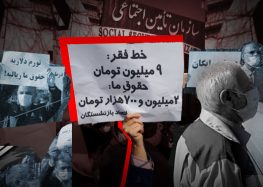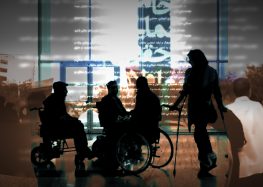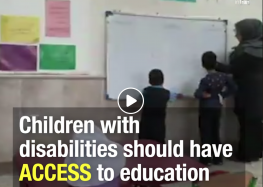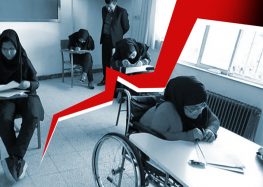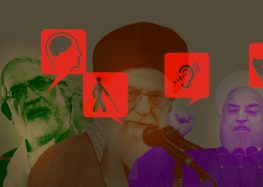Government Unlawfully Failing to Implement Disability Rights Law
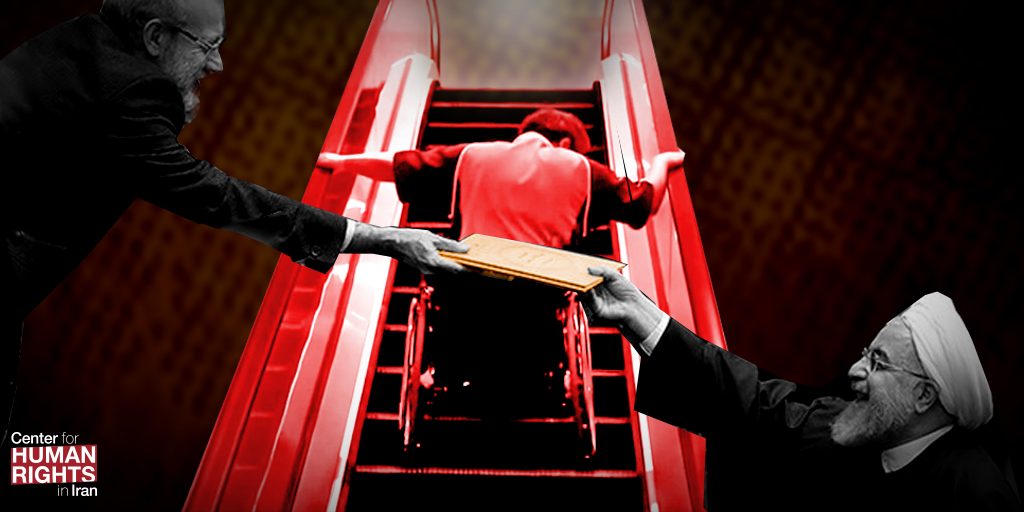
A year after Parliament ratified the Law for the Protection of the Rights of Persons With Disabilities, the Iranian government has approved only a tenth of the budget proposed by the State Welfare Organization (SWO) for carrying out the law’s provisions.
The SWO is the main state agency tasked with providing services to people with disabilities in the country.
The lacking financial support comes at a time when vulnerable members of society and their caretakers are struggling to make ends meet under increasing inflation and economic instability following the re-imposition of US sanctions on the Islamic Republic.
According to health ministry official Mohammad Bagher Joghataei, Article 6 of the law, which requires the government to provide insurance coverage for speech and occupational therapies, will not be implemented in 2019 due to lack of funding.
Article 30 required the government to start implementing the law in May 2019 by setting aside separate funding for its provisions, in addition to the SWO’s annual budget.
In 2018, the SWO had estimated that 12 trillion tomans (about $2.85 billion USD at the time) would be needed to enforce the law in the current Iranian year ending March 20, 2020.
But the government has violated Article 30’s compulsory requirements by allocating only 1.1 trillion tomans ($261 million USD), or less than 10 percent of the proposed budget.
Protests Against Government’s Failure to Protect People With Disabilities
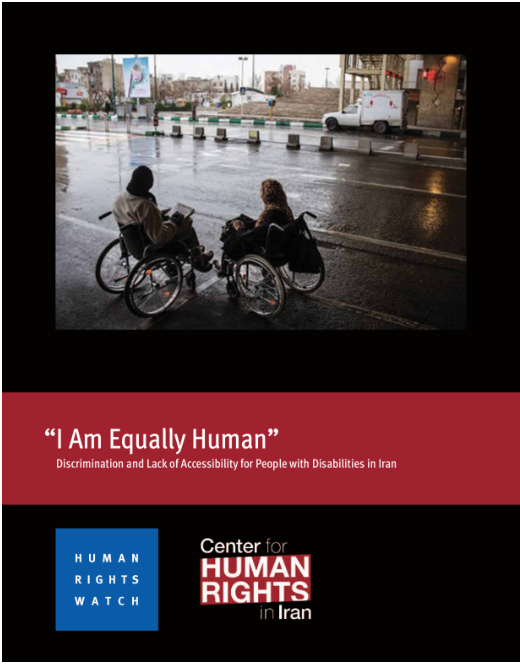
The 72-page report, “‘I Am Equally Human’: Discrimination and Lack of Accessibility for People with Disabilities in Iran,” documents the everyday barriers people with disabilities meet when going to government offices, healthcare centers, and when using public transportation.
The Law for the Protection of the Rights of Persons With Disabilities was passed by Iran’s Parliament in March 2018 and submitted to the government for implementation a month later.
Based on Article 2 of the Civil Code, “Legislative enactments come into force throughout the country fifteen days after their publication.” The government was accordingly required to start implementing the law on May 8, 2019.
However, most of its provisions have not been carried out one year later, according to disability rights activists.
The law was created to assist and support people with disabilities by enabling them to access crucial services.
For example, many people with disabilities in Iran struggle to access services such as physiotherapy, speech therapy, occupational therapy, and psychiatric therapy because state and private insurance providers do not cover them.
To alleviate this problem, Article 6 of the disabilities law requires the Health Ministry to cover those services for registrants under the SWO’s care.
On May 8, the first anniversary of the law’s ratification, a group of people with disabilities gathered in front of the Health Ministry and chanted slogans including “the law for the disabled must be enforced” and “rehabilitation insurance is our inviolable right” while also demanding better healthcare services.
A week earlier, Health Ministry adviser Mohammad Bagher Joghataei stated at a speech therapy conference in Tehran that “the law has been ratified but unfortunately it hasn’t been implemented yet because of lack of funding. Unfortunately, there has been no budget allocation for it this year either.”
“The only way we can make good progress in the area of speech therapy is when there’s insurance coverage for it,” he added.
In response, several people with disabilities, their relatives and supporters including NGOs and advocates, as well as some SWO officials all from various cities across the country signed a petition urging the government to implement the law in full.
The petition reads: “With emphasis on the equal rights of all Iranian citizens, as stated in the Constitution and the Citizens Rights Charter, and stressing the necessity for equal opportunities for citizens with disabilities as well as all other members of society to realize the ultimate goal of a dignified life combined with social welfare, and replacing meager stipends and insignificant, temporary and superficial assistance with a real approach designed to empower people with disabilities, we strongly urge practical measures for the comprehensive participation of people with disabilities in the country’s general policy development and decision making process in order to utilize potentials for the implementation of the Convention on the Rights of Persons With Disabilities and vigorously demand the allocation of the necessary budget for the full enforcement of the Law for the Protection of the Rights of Persons With Disabilities as well as the cabinet’s 2015 enactment to reduce the hardships of millions of people with disabilities caused by material poverty, lack of awareness, and cultural deficiencies.”
Obstacles to Implementing the Law
Some of the most important provisions of the Law for the Protection of the Rights of Persons With Disabilities cannot be implemented without the allocation of sufficient funds, including the payment of nursing costs to people with severe disabilities (Article 7), financial assistance for private employers who hire people with disabilities (Article 12), and pension payouts to people with disabilities based on the minimum wage (Article 27).
After the law was enacted in May 2018 (after the government’s annual budget had already been allocated), Parliament agreed that its implementation would require a separate budget, which in late 2018 the SWO estimated at 12 trillion tomans (about $2.85 billion USD at the time).
During the drafting and ratification of the budget for the current Iranian year ending March 20, 2020, people with disabilities sent letters to legislators and held rallies calling for the allocation of sufficient funds for the enforcement of the disabilities law.
The first rally was held in front of the Plan and Budget Organization headquarters in Tehran on December 3, 2018, and the second on January 6, 2019, in front of Parliament.
Despite these efforts, the government only allocated a small fraction of the budget needed to implement the law’s provisions.
On the other hand, not all the provisions require financial commitments.
Some of them only need the authorities to issue simple orders or change administrative procedures, such as allowing exemptions and benefits to be granted to people with disabilities.
For example, Article 4 requires municipalities to issue construction and renovation permits or completion certificates to residential, commercial, administrative, medical, and educational buildings as well as public spaces only after they’ve met accessibility standards for people with disabilities set by the Iranian Supreme Urban Development and Architecture Council.
The implementation of this article depends on municipal authorities implementing measures that enable them to check if building codes have been fully observed.
One of the main obstacles to implementing the disabilities law is accordingly the lack of documented procedural regulations for some of its provisions.
On February 21, 2019, Maryam-ol-Sadat Mirmalek, the director of rehabilitation services at the Labor Ministry, said procedural regulations had been drafted for final approval by the first vice president to implement Article 3 regarding alterations to public buildings and spaces, to Article 9 regarding higher education tuition exemption, to Article 10 regarding the creation of an employment assistance fund, to Article 12 regarding financial assistance for employers who hire people with disabilities, to Article 13 regarding employment tax exemptions, and to Article 25 regarding 50 percent income tax cuts for one of the parents of people with severe disabilities.
To date, none of these procedural regulations have been made public or enforced.
SWO’s Priorities for Implementing the Law
On April 5, 2019, Hossein Nahvinejad, the SWO’s deputy director in charge of rehabilitation, said the agency had set three priorities for the implementation of the Law for the Protection of the Rights of Persons With Disabilities using this year’s allocated budget:
1) “Our first priority is the pensioners’ livelihood. By law, their pension increases 20 percent every year and this year it has increased by 20 percent as well.”
2) “The second priority is providing nursing services to 25,000 people with spinal cord complications, which is in accordance with previous legislation, and we have to expand it to all bedridden people with disabilities.”
3) “And our third priority is the 115,000 people with disabilities who receive care and training at our centers. The centers have been affected by the current economic crisis and we have to revise the allocation of their assistance funds.”
The official continued: “Besides those three priorities, there are secondary priorities that include the allocation of necessary funds to cover the increasing cost of rehabilitation equipment and carrying out building alterations in the homes of people with disabilities for which a contract has been signed this year with the construction division of the Basij militia.”

